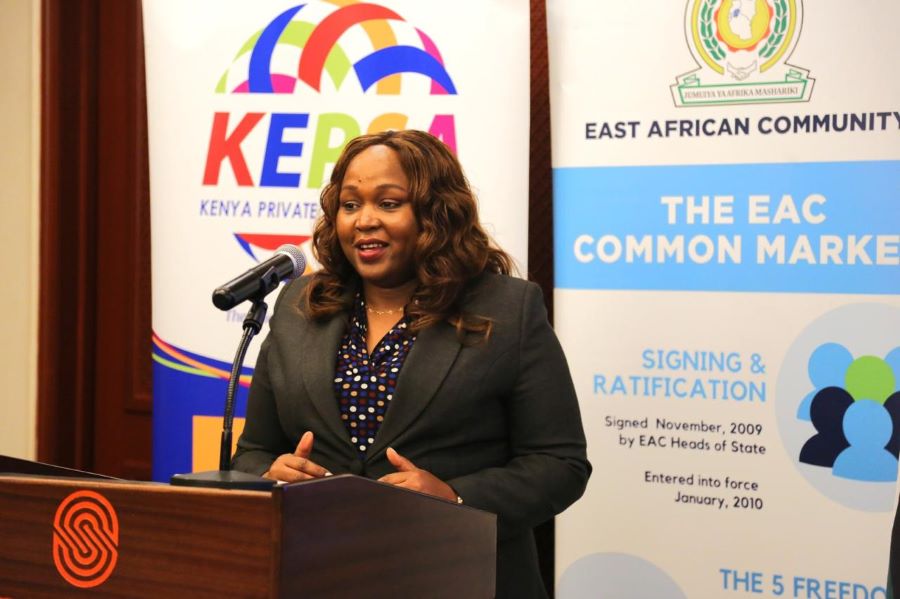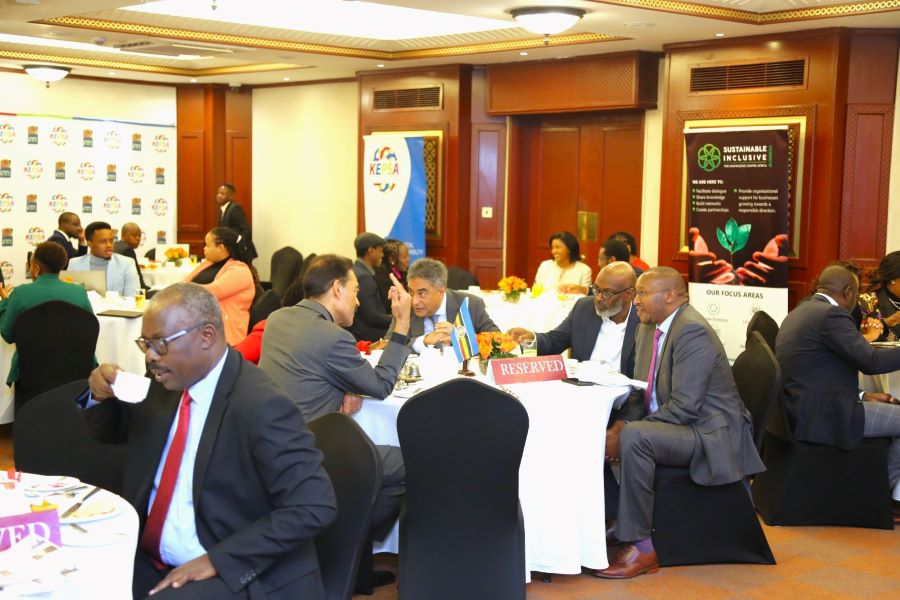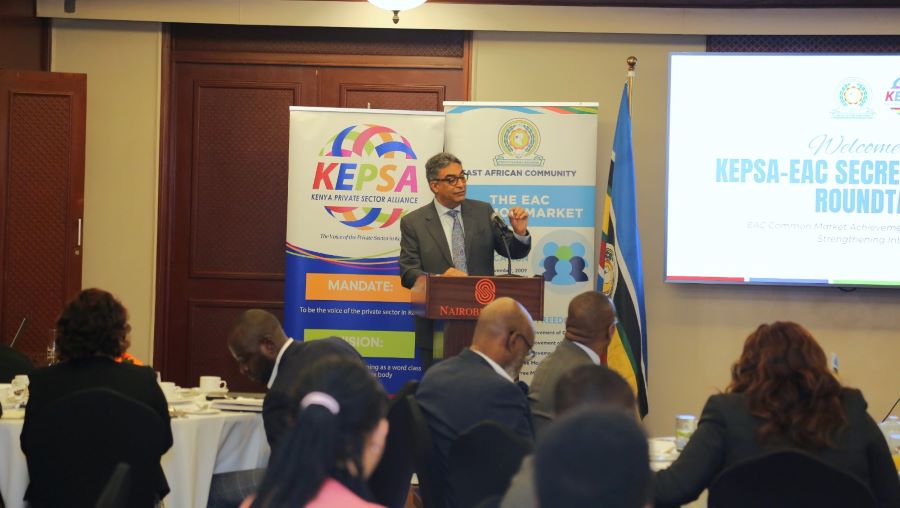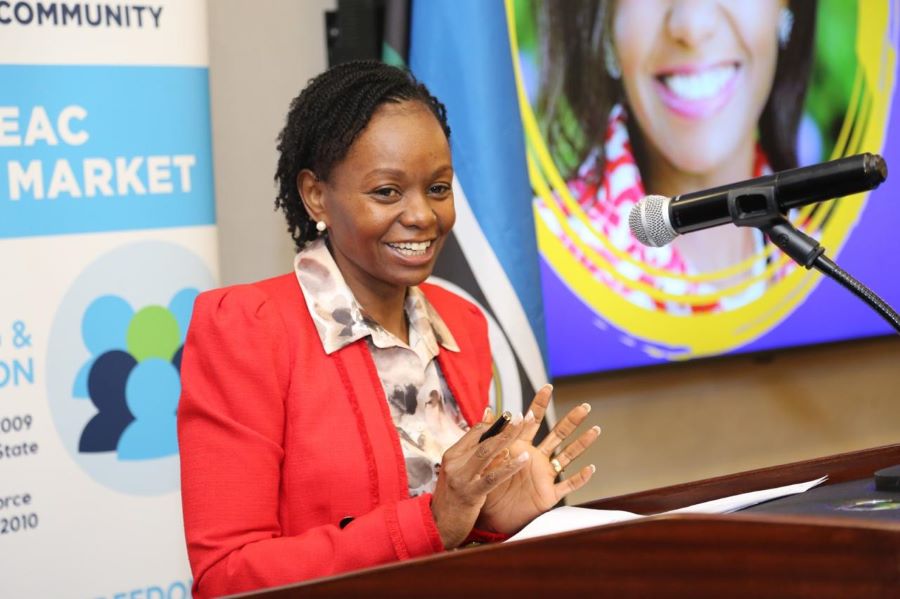
KEPSA hosts East African Community Secretary General Roundtable
Nairobi, 14th August 2024: The Kenya Private Sector Alliance (KEPSA) today hosted the East African Community (EAC) Secretary General Roundtable at the Nairobi Serena Hotel. This engagement between KEPSA and the EAC Secretariat is a pivotal mechanism for driving regional economic integration, improving the business climate, and ensuring that the private sector's voice is heard in the policymaking process.
It underscores the importance of collaboration between the public and private sectors in achieving a more integrated and prosperous East African region; ultimately, enhancing the ease of doing business and fostering Kenya’s competitiveness in the region and globally.
The Community has recorded several achievements in implementing the different stages of integration including the use of an electronic EAC Passport as a common travel document, removal of visa requirements for the EAC citizens from one Partner State to another, issuance of gratis student passes among others, implementation of the Single Customs Territory, and the adoption of a four-band structure. The region is projected to grow by 5.1% this year and 5.7% in 2025, outpacing the global and Sub-Saharan African averages
Speaking at the Roundtable, the EAC Secretary General, H.E. Veronica Nduva, CBS, noted that to forge forward, the regional private sector needs to find a common ground where safeguarding national interests aligns with promoting regional benefits. “To reduce protectionism by EAC Partner States, the private sector needs to embrace product diversification, specialisation and value addition in manufacturing and take advantage of the over 300 million EAC market,” she noted.

Ms. Nduva provided an overview of the intra - EAC Trade value noting that it had increased by 14% to USD 12.2 Billion in 2023 compared to 9.2% at USD 10.7 Billion in 2022 with a percentage share of 13% of total EAC trade with the Rest of the World. “The EAC total trade grew by 2.3 percent to US$80.6 billion in 2023 from US$78.7 billion in 2022,” she added.
The Secretary General called on the private sector to invest in sectors that have the potential to drive economic growth such as manufacturing, agriculture and services and to promote regional integration, trade and investment to maximize the potential benefit of economic growth. Ms. Nduva noted that the EAC Secretariat has made great strides, but more still needs to be done.
“The EAC Customs Union has successfully eliminated tariffs on intra-regional trade since 2005, resulting in a remarkable over 60% increase in intra-EAC trade. The introduction of the Non-Tariff Barriers (NTB) reporting platform has been transformative for trade facilitation within the EAC. With over 1,000 standards harmonized, intra-EAC trade has been significantly streamlined, ensuring consistent quality and safety of products and services,” she noted, further reiterating EAC’s commitment to pushing for fast tracking of laws and policies across various Partner States to comply with the Common Market Protocol commitments.
Intra-EAC and inter-regional trade increasingly reflects more manufactured products such as textiles, chemicals, edible oil, cement, iron and steel, cosmetics, plastics and pharmaceuticals; and KEPSA has made instrumental contributions towards the significant strides made by EAC in enhancing economic growth, trade, and investment among its member states.
Particularly, the apex body of the private sector in Kenya has supported regional integration initiative, including championing the elimination of non-tariff barriers (NTBs). Furthermore, KEPSA has also actively advocated the revision of stringent rules through robust policy dialogue and stakeholder engagement. This advocacy is essential for creating a more conducive business environment for the private sector in Kenya and the region, enhancing their competitiveness and facilitating better market access.

On his part, the KEPSA Chair, Dr. Jas Bedi, acknowledged that as the largest economy in the EAC, Kenya has greatly benefited from regional integration. The service sector, particularly travel and other services, has been a key driver of growth, accounting for over two-thirds of total trade in services. However, he said, the EAC still faces challenges in industrialization. The region remains under-industrialized due to factors like low electricity access, high costs, poor infrastructure, and protectionist policies.
“Addressing these issues is crucial for boosting competitiveness and reducing trade deficits, and one of the things we propose is the establishment of a regional task force to identify and address these bottlenecks, with input from the private sector. KEPSA stands ready to collaborate with the EAC Secretariat and Partner States to address the private sector's concerns and unlock the region's economic potential,” said Dr. Bedi.
The roundtable outlined these and other critical issues impacting intra-EAC trade and investment, alongside proposed actionable steps for the EAC Secretariat and Member States, as well as for the private sector to address them.
“One of the critical areas that need urgent attention is the alignment and integration of the revenue collection processes among EAC Member States. Currently, importers face varying requirements and levies despite sourcing from the same jurisdiction and dealing with similar products under the same Harmonized System (HS) codes,” noted Ms Carole Kariuki, the KEPSA CEO. She gave the example of importers in Rwanda and Uganda who often encounter discrepancies in levies for identical goods, leading to inconsistencies that hinder trade efficiency.

Additionally, standards and permits for importing goods are not uniformly applied, which creates uncertainty and delays at the borders. “Therefore, establishing a single window digital platform where importers and exporters can access harmonized information and guidelines in real-time would be a significant step forward. This platform should allow for instant resolution of queries and ensure that directives from authorities are consistently applied across all member states. Such a system would encourage new entrepreneurs to enter the market by providing a clear and predictable trading environment,” said Ms Carole.
The roundtable emphasized robust collaboration among businesses within the region, as an essential strategy for growth and competitive advantage in the contemporary business landscape. Additional recommendations from KEPSA included aggressive civic education campaigns to inform traders and the public about the rules, tariffs, and processes involved in cross-border trade; eliminating paper-based processes in favor of fully digital transactions, managed by a centralized EAC platform; addressing corruption at border posts; and increasing the value addition in exports and differentiating products to enhance competitiveness. Moreover, the integration efforts should be continuously refined to respond to the dynamic needs of the market and the aspirations of its member states.
Editor’s Note:
Access the respective statements during the roundtable here: https://kepsa.or.ke/public/resource-locator/speeches
For more information, please contact:
Simon Peter Owaka
Senior Public Relations Officer
Corporate Communications and Public Affairs Department
EAC Secretariat
Arusha, Tanzania
Tel: +255 768 552087
Email: This email address is being protected from spambots. You need JavaScript enabled to view it.
OR
Josephine Wawira
Corporate Communications Manager
Kenya Private Sector Alliance (KEPSA)
Email: This email address is being protected from spambots. You need JavaScript enabled to view it.
About the East African Community Secretariat:
The East African Community (EAC) is a regional intergovernmental organisation of eight (8) Partner States, comprising the Republic of Burundi, the Democratic Republic of Congo, the Republic of Kenya, the Republic of Rwanda, the Federal Republic of Somalia, the Republic of South Sudan, the Republic of Uganda and the United Republic of Tanzania, with its headquarters in Arusha, Tanzania. The Federal Republic of Somalia was admitted into the EAC bloc by the Summit of EAC Heads of State on 24th November, 2023 and became a full member on 4th March, 2024.
